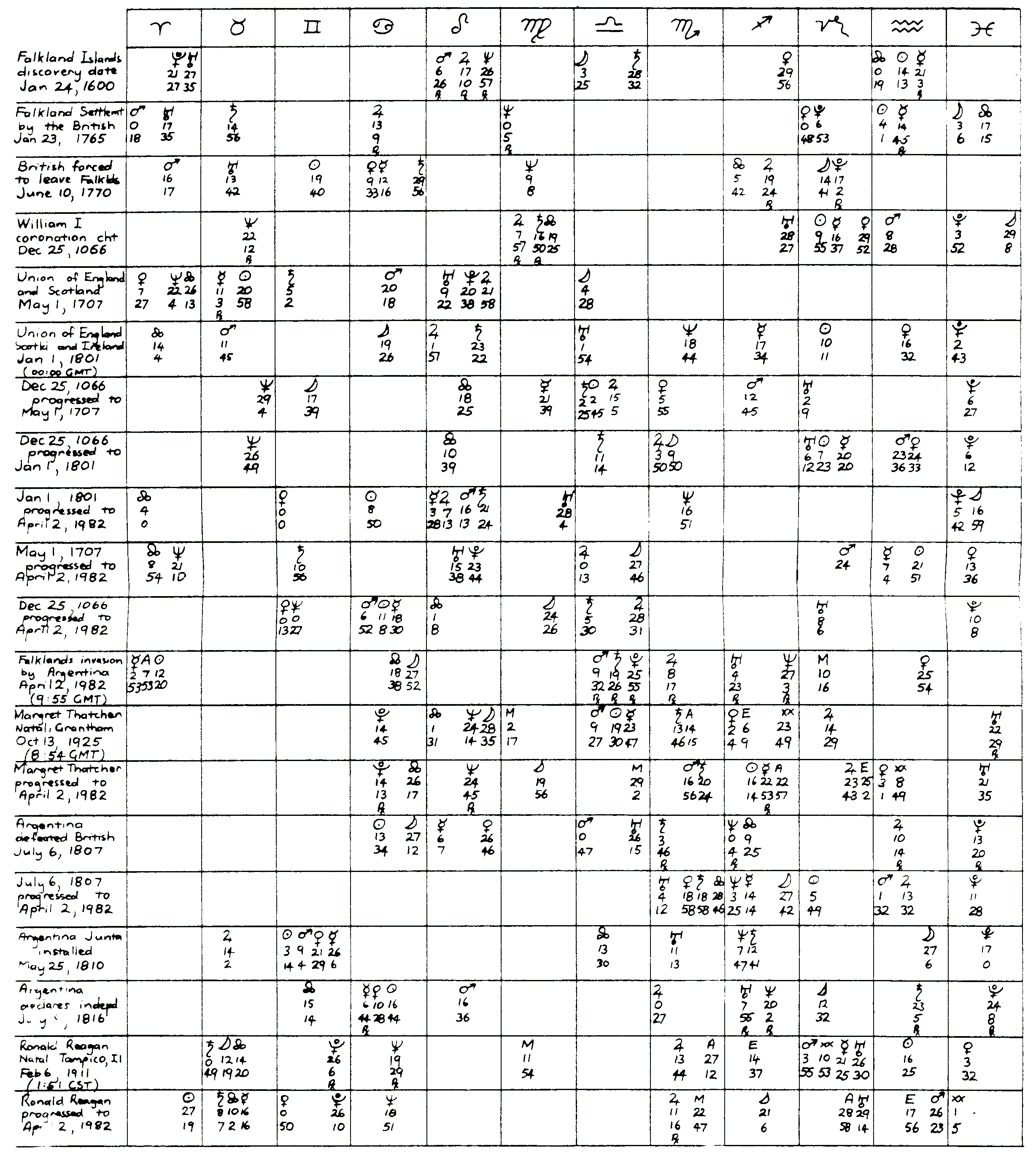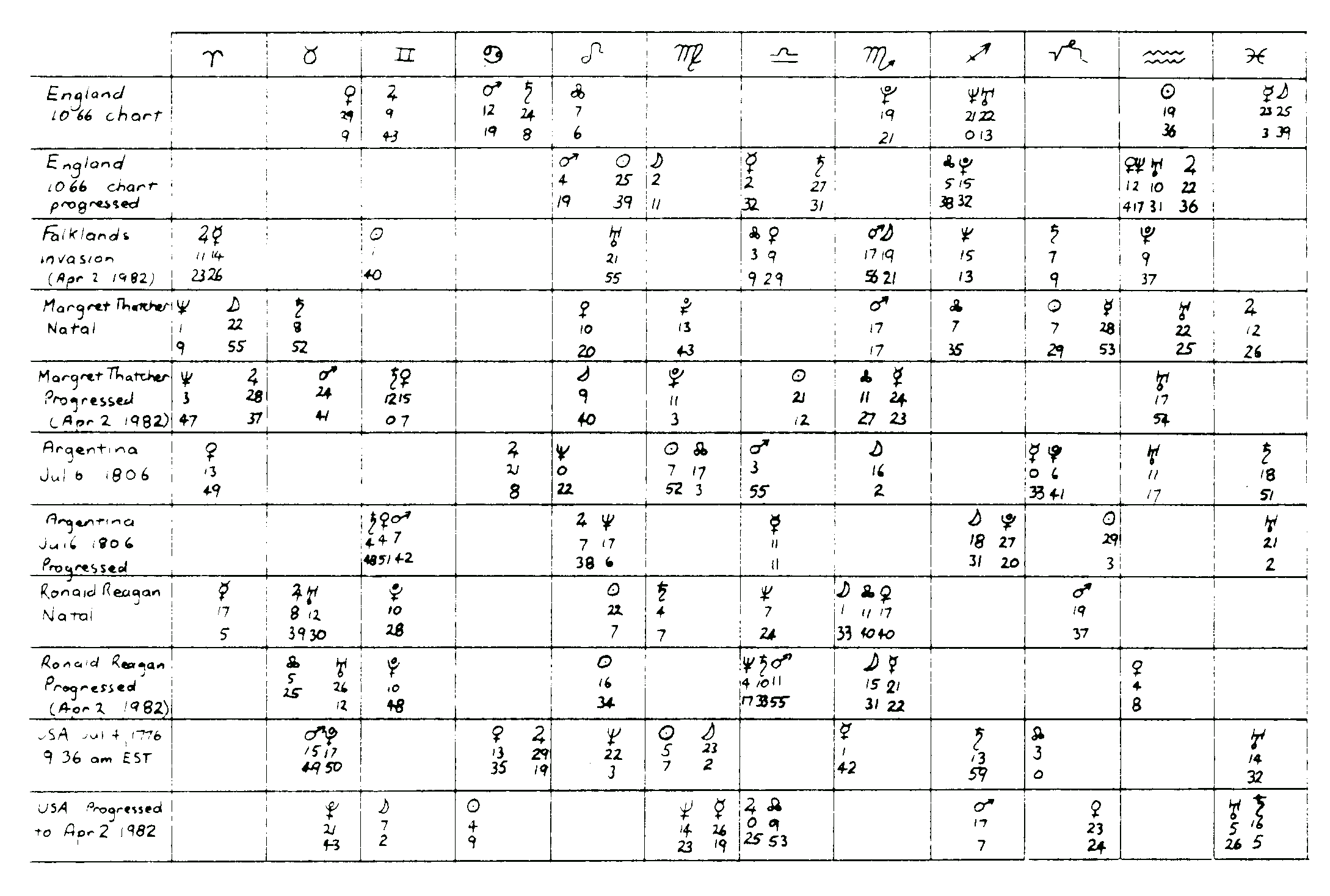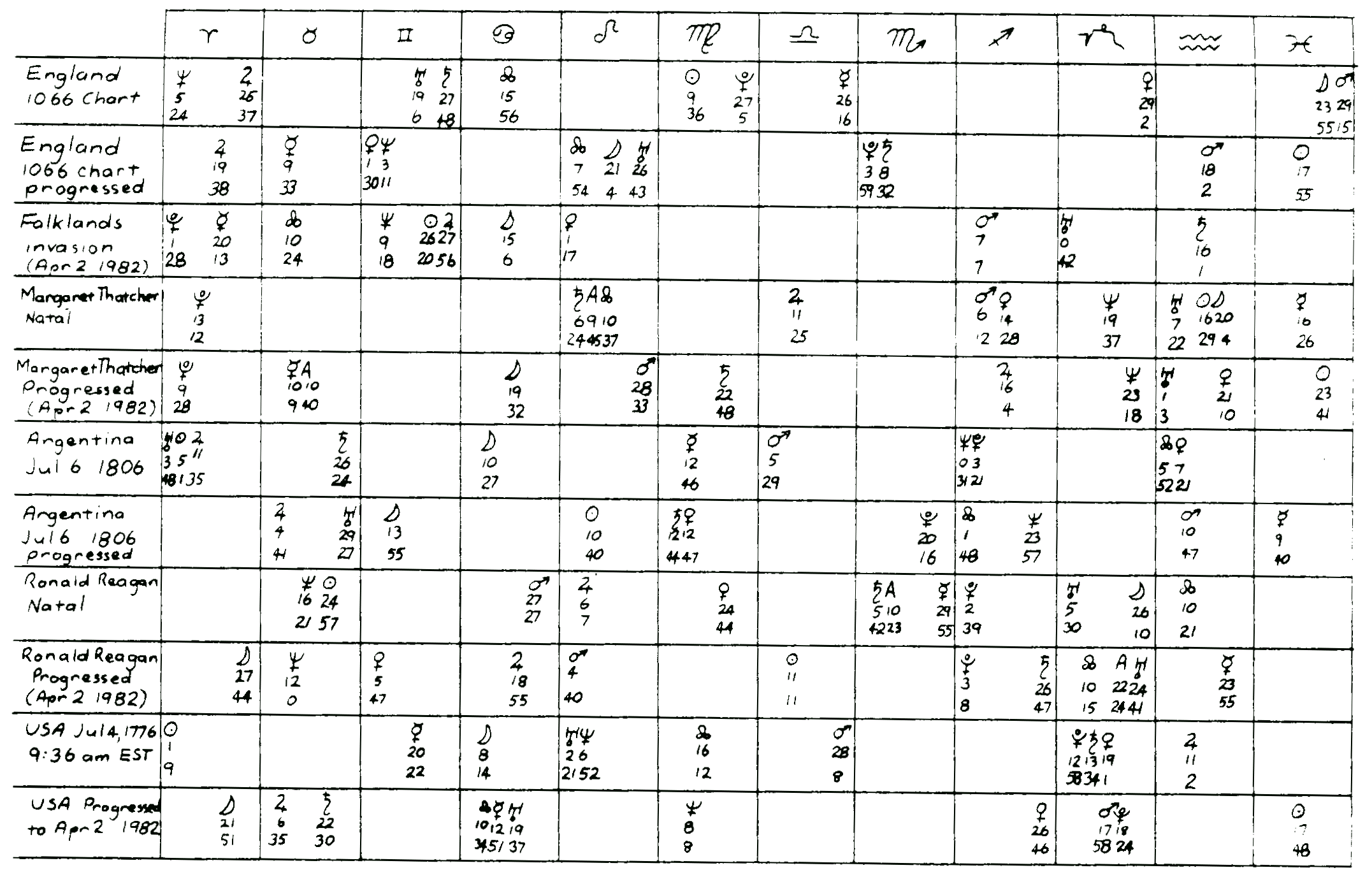The Falklands
David Reynolds
HISTORICAL PERSPECTIVE
Relating events in mundane astrology has always been hampered by lack of detailed accounts (especially with respect to time), non-specification of calendars used and the non-availability of accurate ephemerides for early dates. The change of calendar from Julian to Gregorian occurred in 1582, but England and its colonies did not adopt it until 1752. The River Plata being a Spanish colony adopted the Gregorian calendar in 1582. The records and accounts come from both British and Argentine sources and as far as possible the dates given here are Julian prior to 1752 and Gregorian thereafter. All computations are accurate to within 2' of arc (including the 1066 positions) but it must be strongly emphasized that the calculations are precise for the time specified e.g. 00:00 GMT or 12:00 GMT and as only dates without times are given the value of ascendant and moon position is contentious. Noon has been used generally so that the true moon position for the day's event is no more than 6 degrees away from the position given. In the tables the computed position is given: the latitude of 'accuracy' is left to the reader.
As a preliminary to the events in the Falklands the birth chart of England to be used should be established, as this is an event in the unfolding of England's development.
William the Conqueror invaded England and defeated King Harold, son of Godwin at the Battle of Hastings on Oct 14, 1066. William's coronation was on Dec 25, 1066. Since William, there have been no major changes in the structure of the population through invasion. The beginnings of government can be traced to William I's time. The history of England has fluctuated from monarchy through parliamentary control under Oliver Cromwell, settling on the Westminister parliamentary system: the monarchy having status but little real power.
The union of Scotland and England came about both for political and economic reasons. Both parliaments agreed to the union in 1706 and the act of union was passed by both governments on May 1, 1707.
The natal chart set up for 1707 fits well with the expansion of the Empire and with it wealth and power. The progressed 1066 chart has the same indicators.
The act of union between England, Scotland and Ireland became effective at 00:00 hours on Jan 1, 1801, from that time being known as The United Kingdom. The progressed 1066 chart has the Sun and Uranus conjunct with the 1066 natal position and also with the Sun position on Jan 1.
The discovery of the Falkland Islands is by no means clear. It seems likely though, that the English navigator, John Davis, first sighted them in 1592 although the Argintines would not agree. The Dutch navigator Sebald van Weert named the islands after himself on Jan 24, 1600. The first definite British contact was by John Strong who sailed through the channel dividing the islands, naming it Falkland Sound on Jan 27, 1690. He did not take possession of the islands. In 1740 it was suggested that a base be set up on the islands by the British. This met with opposition at the Spanish court. It appears that a base was established in 1748 and the first British settlement was begun by Commodore Byron on Jan 13, 1765. He took possession for King George III at Port Egmond on the western island. In the meantime the French had settled the eastern island on Feb 2, 1764 consisting of a brotherhood of Benedictine Monks who were later joined by craftsmen and farmers.
The Spanish protested about the French settlement. The French conceded to their claims and were bought out. The settlement was handed over to the Spanish in a ceremony on Apr 1, 1767. The Spanish and English coexisted until in 1769 the Englishman, Captain Hunt warned off a Spanish cruiser. The Spanish Governor sent him a letter of protest. Hunt then warned the Spanish to leave since the islands belong to His Britannic Majesty! The Spanish Governor in return warned Hunt to leave. Six months later, acting on orders from Madrid, the British settlement was uprooted on June 10, 1770 by "a squadron and troops". Britain demanded that the injury be repaired: not only that but they were prepared to take Spain to war over the issue. Spain would not have capitulated had France given its support as it had done in the past. France would not, so Carlos III was forced to accommodate. On Jan 22, 1771 he officially gave over the islands to the British. After three years the British abandoned their settlement in May 1774 leaving a leaden plate claiming the islands for Great Britain. The Spanish maintained their settlement until 1806.
Meanwhile Argentina was becoming a nation. The Spanish were leaving The River Plata (Argentina) poorly defended. In 1804 Britain was at war with Spain. Buenos Aires fell easily to Sir Hugh Popham and General Beresford early in 1806, however they needed reinforcements to suppress a revolt from the people. The reinforcements did not arrive before Santiago Liniers engaged Beresford with a makeshift army and forced him to surrender on Aug 12, 1806. Liniers was made viceroy by the Cabildo (General Congress) and preparations were made to defend Buenos Aires. The British sent General Whitelocke to retake the capital but after two battles Whitelocke agreed to a settlement in which he had his and Beresford's troops restored (those that were remaining) and that they would withdraw to Montevideo and be gone within two months. This was on July 6, 1807. The leaden plate left on the Falklands by the British was sent back to England with Beresford.
On May 13, 1810 news that the Spanish Central Junta had failed reached Buenos Aires. Things moved quickly: by May 24 the Cabildo (now half American and half European) had organized a temporary junta but it was not until May 25, 1810 and after three meetings on that day that a junta of nine was sworn in.
The other date that is considered as a possible birth date is July 9, 1816 when the congress, by a unanimous vote, issued a solemn declaration of independence. Included in those proceedings was the claim that the Falkland Islands should be regarded as part of Argentina.
On Jan 3, 1833 the British, by force, reclaimed the islands. The Americans, who were part of the population at that time organized themselves into a guerilla resistance which lasted for several months. Britain has retained control of the islands until the present situation, granting them colony status in 1892.
I have used the July 6, 1807 chart for Argentina in this article essentially because the direct confrontation with the British is repeated. It also was the first independent action the Argentines took.
CURRENT SITUATION
If a chart is set up for the moment of the first shot in the Falklands (9:55 a.m. GMT Apr. 2, 1982) a horary analysis can be made. However, the situation involves more than just the Falkland Islands, so this perspective is too limited for this situation. England regarded itself as the protector of the free world in the 19th and 20th centuries until the United States took over this role. England could also be paralleled to the Greek civilization, and the U.S. with Rome. To develop this analogy is interesting particularly if the notion of archetypes repeating themselves is also thrown in. That is: are we witnesses to the beginning of the second fall of Troy? And, if so, what does this mean in evolutionary terms for the inhabitants of the world?
The mundane charts can be analyzed in terms of the collective psychology of the people; regarding the country as an individual with all the problems and dilemmas of a single consciousness. The 5th and 7th harmonic charts allow analysis of the less mundane aspects (using mundane charts to go beyond the mundane). This is not to underrate the 8th harmonic or horary analysis but merely to present a perspective that is generally overlooked. The 5th harmonic relates to power (to create and/or destroy) and indicates where and how a country best expresses itself or highlights its weaknesses as it evolves. This is particularly true in times of extreme activity.
The 7th harmonic is more difficult to define. Neptune is the natural ruler of this harmonic, so things Neptunian can be applied to it. In addition, there is a quality of Fate or destiny associated with it.
In mundane astrology, Neptune has been associated with poor judgment and disintegration. This may apply here. It is interesting to note that the latitude of the Falklands is 51S30; London's latitude is 51N30. The septile angle is also, approximately, 51 degrees and 30 minutes.
The degree 28 Sag. 27 has always been a sensitive and dangerous position for England (Ref: C.O. Carter, An Introduction to Political Astrology). Neptune by transit is within two degrees of this position most of this year, transiting it in February, 1983. Also, the 1066 chart progressed to 1982 shows Venus conjunct Neptune. The implication being that England will be too emotional and likely to make poor judgments.
Argentina, using the July 6th chart, has transiting Uranus conjunct natal and progressed Neptune all year. England has the Sun by progression within one degree of opposition to its natal Sun.
The charts of the leaders add dramatic emphasis to the situation. Margaret Thatcher, at the time of the invasion, had Mars transiting her natal Mars; Saturn transiting her natal Sun; Uranus transiting natal Venus; and her local Ascendant in the Falkland Islands was the same degree as Mars. Not surprisingly, she went to war and England accepted it. (See the rectification article in this issue for Galtieria's birth data.)
Table 1: First Harmonic 360°

THE FIFTH HARMONIC CHART
The 360 degree circle, divided by 5, gives the quintile angle of 72 degrees. The 5th harmonic chart shows planets that are quintile or bi-quintile as conjunctions. Because the circle is virtually laid over on itself five times, the separation of aspects is emphasized. For example, Margaret Thatcher's natal Mars/Saturn conjunction of orb 3 degrees and 28 minutes (See Table I.) separates to 17 degrees 19 minutes in the 5th harmonic chart. This means that the harmonic chart separations of five degrees in Table I have a real orb of only one degree. Similarly, England's Neptune/Uranus conjunction in the fifth harmonic table (orb of 1 degree 3 minutes) is actually separated by an angle of 143 degrees 45 minutes. The bi-quintile angle is 144 degrees so the orb is only 15 minutes.
In the context of the fifth harmonic representation, the aspects of Neptune, Uranus, Saturn and Pluto for both Argentina and England, and the planetary positions at the time of the invasion suggest that Britain is trying to retain the power and glory it used to have and cannot see the situation realistically. It is likely to endure heavy losses. (Pluto quintile Uranus applying) While Argentina, with transiting Uranus in aspect to natal Neptune could not foresee the consequences of its action.
Table 2: Fifth Harmonic 72°

THE SEVENTH HARMONIC
The same general principles apply to orbs here except that one degree separates to seven degrees in the seventh harmonic table. Argentina's natal Uranus/Sun and Neptune/Pluto aspects describe many of Argentina's historical events well. England's progressed Venus/Neptune and Saturn/Pluto describe their reaction to the invasion accurately: emotional and idealistic, unbending with the threat of losing all.
The fated quality of the seventh harmonic makes the configurations of the Nodes in this table particularly significant.
Table 3: Seventh Harmonic 51° 26’

THE FUTURE
By including Ronald Reagan's and the U.S. chart, it is obvious that I think the U.S. will be involved. The day of writing is the eighteenth of May, so events described from here on are speculative based on transit graphs for the 5th, 6th, 7th, and 8th harmonics.
The lull that now exists is likely to end between the 22nd and 28th of May: the most drastic action being on the 28th. (This day is marked by transits of Mars to natal or progressed planets in three of the graphs.) Between then and the 19th of June, particularly the 9th to 19th, England is likely to steadily find herself in a worsening position, the darkest hour being between the 5th and the 7th of July. (Mars/ Saturn interaction in the 7th harmonic graph) The 19th of July marks the beginning of America's probable involvement—if not in fact, certainly in principle. With direct involvement likely about the 17th of September. The 26th of November period appears to be the end, but the end will be very tenuous.